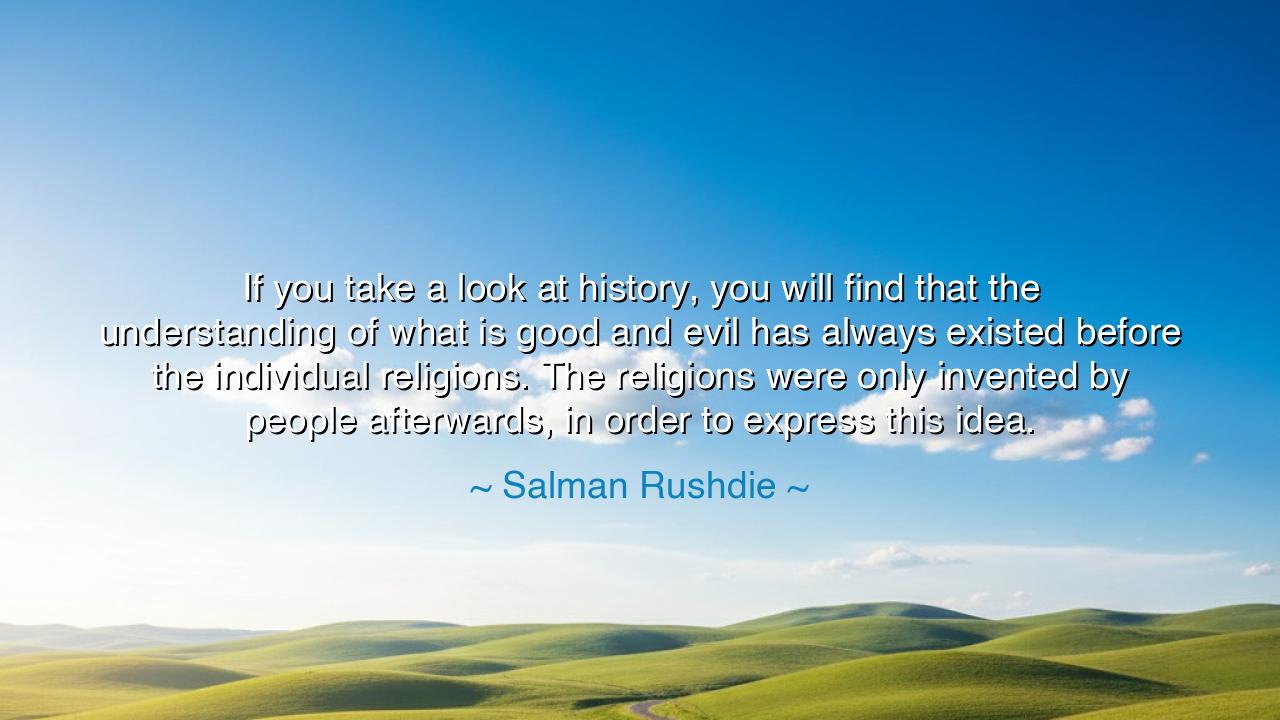
If you take a look at history, you will find that the
If you take a look at history, you will find that the understanding of what is good and evil has always existed before the individual religions. The religions were only invented by people afterwards, in order to express this idea.






Salman Rushdie, a man whose pen has carved both controversy and wisdom into the annals of modern thought, once declared: “If you take a look at history, you will find that the understanding of what is good and evil has always existed before the individual religions. The religions were only invented by people afterwards, in order to express this idea.” These words pierce through the veils of dogma and ritual, reaching into the ancient marrow of humanity itself. They remind us that before temples and scriptures, before prophets and priesthoods, there already lived within mankind an innate sense of good and evil, a sacred compass not given by religion but born of the soul.
The meaning of this quote is both humbling and revolutionary. Rushdie suggests that morality precedes religion — that the awareness of right and wrong is older than any sacred text, older than the names of gods. Religion, he says, is not the origin of goodness, but its translation, a vessel built to contain what was already known in the heart. This is no denial of faith; it is a revelation of humanity’s deeper nature. It tells us that the divine spark lies within, and that long before humans sought gods in the heavens, they found virtue and cruelty written in their own actions.
To understand the origin of this thought, one must look back to the earliest dawn of civilization. Before the rise of organized faiths, the tribes of the earth already understood compassion, justice, loyalty, and courage. The hunter who shared his food, the mother who defended her child, the elder who mediated conflict — these were acts of moral knowing. They were not commanded by gods but inspired by conscience, by that mysterious harmony between human life and the natural order. When religions arose, they did not invent morality; they codified it, giving it voice and structure so that future generations might remember.
This truth was known even to the ancients. The philosopher Socrates, centuries before the rise of Christianity, asked whether goodness exists because the gods love it, or whether the gods love it because it is good. His question revealed what Rushdie now echoes: that goodness is eternal, existing independently of divine decree. Even the great Buddha, born among rituals and caste hierarchies, turned away from tradition to seek enlightenment within — not through worship, but through the discipline of mind and heart. And so it has always been: religions change, fade, or fracture, but the human sense of right and wrong endures, untouched by the passage of time.
Consider, too, the story of Hammurabi, king of Babylon, who carved his code of laws into stone nearly two thousand years before the birth of Christ. His edicts — forbidding theft, honoring fairness, protecting the weak — stand as testament that justice was known before theology claimed it. Or recall the ancient Egyptians, who spoke of Ma’at, the goddess of truth and balance, long before any prophet spoke of divine commandments. Their wisdom reminds us that the moral order is woven into the very fabric of existence — not as a gift bestowed from above, but as a light kindled within every soul.
Rushdie’s words, then, are not an act of rebellion against faith, but an invitation to humility. They urge us to remember that no religion owns virtue, no scripture has a monopoly on compassion. The sacred texts of the world — the Bible, the Quran, the Vedas, the Tao Te Ching — are like mirrors, reflecting the light of goodness already shining within humanity. When men forget this, when they mistake the mirror for the light itself, they fall into conflict and division. But when they remember that goodness is universal, older than creed and older than name, they rediscover their kinship with all mankind.
The lesson here is clear: seek not goodness in doctrine, but in consciousness. The temples of stone may crumble, the prophets’ words may be debated, but the quiet knowing within your heart — that sense that life thrives in kindness, that cruelty wounds the soul — is eternal. To live rightly is not to follow rules, but to awaken that ancient awareness and walk with it each day. Be honest not because your god commands it, but because truth is the foundation of harmony. Be merciful not for reward, but because mercy sustains the world.
So remember, children of time: religions are rivers, but morality is the sea. The rivers may take many shapes, winding through mountains and deserts, but they all flow toward the same vast truth — that within every human being burns the quiet fire of conscience. Tend to that fire. Let it guide your steps. For before the first prayer was spoken, before the first altar was built, good and evil already lived in the heart of man, and it is there — not in temples, nor in laws — that the true sacred resides.






AAdministratorAdministrator
Welcome, honored guests. Please leave a comment, we will respond soon